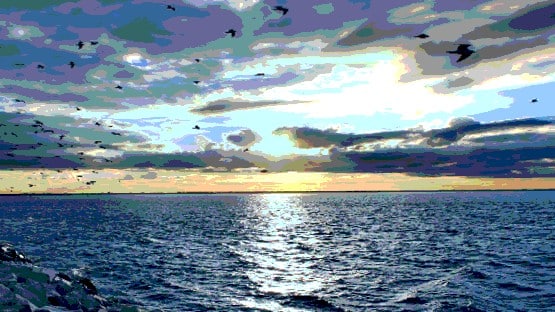
At an event held today at the Lubber Run Community Center in Arlington, more than $13.4 million in grant awards to protect and restore the Chesapeake Bay watershed in Virginia were announced.
The funding was announced by the National Fish and Wildlife Foundation (NFWF), U.S. Environmental Protection Agency (EPA) and the federal-state Chesapeake Bay Program. The 22 grants announced today will generate more than $8.6 million in matching contributions for a total conservation impact of more than $22 million.
The historic investments will support on-the-ground clean water, climate resilience and community engagement projects. The grants are awarded through the Innovative Nutrient and Sediment Reduction (INSR) Grant and Small Watersheds Grant (SWG) programs, core funding programs of the Chesapeake Bay Program that are administered under NFWF’s Chesapeake Bay Stewardship Fund. The Stewardship Fund is a partnership between NFWF, EPA and other federal and private funders that provides grant funding, technical assistance, networking and information sharing in support of local, on-the-ground conservation and restoration efforts to restore the Chesapeake Bay and its tributaries.
“With 2024 marking 25 years of partnership between NFWF and the EPA in advancing efforts to protect and restore the Chesapeake Bay watershed, we’re thrilled to celebrate this programmatic milestone with a record annual investment of $25 million in voluntary and community-based projects across the Bay watershed,” Jeff Trandahl, executive director and CEO of NFWF, said.
Some of this year’s Chesapeake Stewardship Fund grant recipients in Virginia include:
- Alliance for the Chesapeake Bay ($500,000): This grant will leverage existing partnerships to engage rural Shenandoah Valley and western highlands of the Chesapeake Bay watershed in incentivizing landowners to implement riparian buffers to promote the habitat connectivity for Eastern brook trout and other cold-water species. Project will install 20 acres of riparian forest buffers and two miles of livestock exclusion.
- Arlington County, Virginia ($282,390): Funding will allow for the installation of three green stormwater infrastructure practices that will intercept more than four acres of upland stormwater runoff. Project will conduct a variety of nature-based and watershed educational activities in the community to help engender awareness and watershed protection in the North Barcroft community.
- James River Association ($749,305): This grant will build on recent successes implementing green infrastructure projects at Richmond Public Libraries by expanding efforts to additional campuses and supporting residential adoption through rain barrel workshops, native plants workshops and tree giveaways. Project will treat stormwater runoff from nearly three acres of developed land in Richmond.
- Rivanna Conservation Alliance, Inc. ($500,000): This grant will assist in halting excessive streambank erosion, restore habitat through native buffer plantings, and enhance urban stormwater management and climate resilience through upland tree planting in Charlottesville, Virginia. Project will reduce annual sediment runoff by more than 320,000 pounds.
- Urbanna Oyster Festival Foundation ($360,986):Funding will create a highly visible and functional non-tidal wetland as a means to inspire and activate people throughout the Chesapeake Bay watershed to engage their own communities in habitat restoration and stormwater management. Project will result in improved stormwater management for 13 acres and additional community engagement and educational opportunities.
A complete list of the 2024 Chesapeake Stewardship Fund Innovative Nutrient and Sediment Reduction Grant and Small Watersheds Grant recipients can be found on the NFWF website.
At the same event this morning, the EPA announced approximately $206 million in awards to NFWF and the Chesapeake Bay Trust to continue funding local projects and providing technical assistance for protecting and restoring the Chesapeake Bay and its watershed over the next four years. The funding includes $96 million from the Bipartisan Infrastructure Law.
“These grants reflect our continuing commitment to protect the Chesapeake Bay and preserve our nation’s environmental legacy for future generations,” said EPA Mid-Atlantic Regional Administrator Adam Ortiz. “This historic investment by the Biden-Harris Administration enables EPA to continue providing game-changing funding for our partners who are equally committed to preserving, protecting and enhancing the communities, people and businesses who rely on the Bay.”
The $193 million awarded to NFWF for the Small Watershed and Innovative Nutrient and Sediment Reduction grants is in addition to $13 million provided to the Chesapeake Bay Trust, a non-profit grant-making organization, to administer a new Community Capacity Building grant program.
“Without strong communities and strong nonprofits realizing multiple benefits from and participating in natural resource efforts, we will not be able to realize our vision of a restored watershed,” Dr. Jana Davis, president of the Chesapeake Bay Trust, said. “The Bay Trust will be investing these resources in a wide range of community-based organizations and local governments, many of them historically excluded, to build their capacity to restore watersheds and improve public health.”










